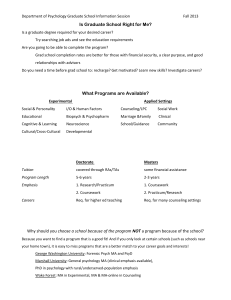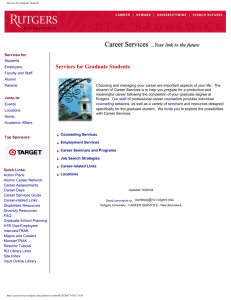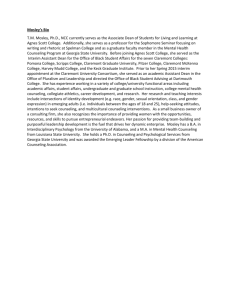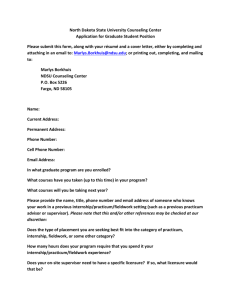Human Development Career Options This list provides students with
advertisement
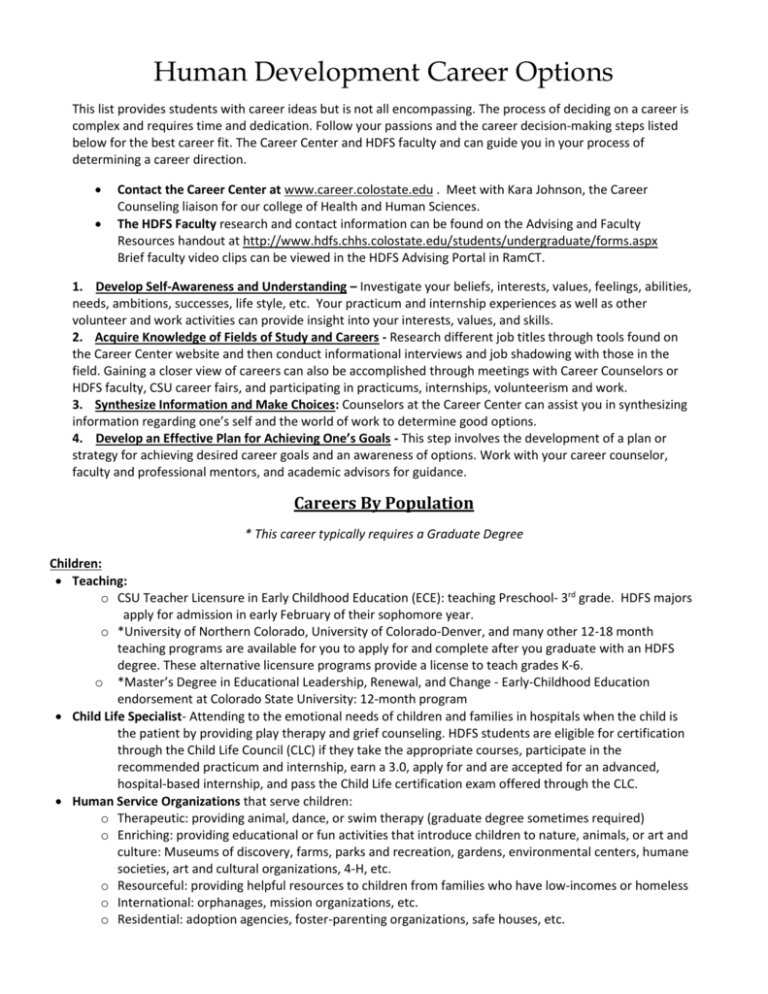
Human Development Career Options This list provides students with career ideas but is not all encompassing. The process of deciding on a career is complex and requires time and dedication. Follow your passions and the career decision-making steps listed below for the best career fit. The Career Center and HDFS faculty and can guide you in your process of determining a career direction. Contact the Career Center at www.career.colostate.edu . Meet with Kara Johnson, the Career Counseling liaison for our college of Health and Human Sciences. The HDFS Faculty research and contact information can be found on the Advising and Faculty Resources handout at http://www.hdfs.chhs.colostate.edu/students/undergraduate/forms.aspx Brief faculty video clips can be viewed in the HDFS Advising Portal in RamCT. 1. Develop Self-Awareness and Understanding – Investigate your beliefs, interests, values, feelings, abilities, needs, ambitions, successes, life style, etc. Your practicum and internship experiences as well as other volunteer and work activities can provide insight into your interests, values, and skills. 2. Acquire Knowledge of Fields of Study and Careers - Research different job titles through tools found on the Career Center website and then conduct informational interviews and job shadowing with those in the field. Gaining a closer view of careers can also be accomplished through meetings with Career Counselors or HDFS faculty, CSU career fairs, and participating in practicums, internships, volunteerism and work. 3. Synthesize Information and Make Choices: Counselors at the Career Center can assist you in synthesizing information regarding one’s self and the world of work to determine good options. 4. Develop an Effective Plan for Achieving One’s Goals - This step involves the development of a plan or strategy for achieving desired career goals and an awareness of options. Work with your career counselor, faculty and professional mentors, and academic advisors for guidance. Careers By Population * This career typically requires a Graduate Degree Children: Teaching: o CSU Teacher Licensure in Early Childhood Education (ECE): teaching Preschool- 3rd grade. HDFS majors apply for admission in early February of their sophomore year. o *University of Northern Colorado, University of Colorado-Denver, and many other 12-18 month teaching programs are available for you to apply for and complete after you graduate with an HDFS degree. These alternative licensure programs provide a license to teach grades K-6. o *Master’s Degree in Educational Leadership, Renewal, and Change - Early-Childhood Education endorsement at Colorado State University: 12-month program Child Life Specialist- Attending to the emotional needs of children and families in hospitals when the child is the patient by providing play therapy and grief counseling. HDFS students are eligible for certification through the Child Life Council (CLC) if they take the appropriate courses, participate in the recommended practicum and internship, earn a 3.0, apply for and are accepted for an advanced, hospital-based internship, and pass the Child Life certification exam offered through the CLC. Human Service Organizations that serve children: o Therapeutic: providing animal, dance, or swim therapy (graduate degree sometimes required) o Enriching: providing educational or fun activities that introduce children to nature, animals, or art and culture: Museums of discovery, farms, parks and recreation, gardens, environmental centers, humane societies, art and cultural organizations, 4-H, etc. o Resourceful: providing helpful resources to children from families who have low-incomes or homeless o International: orphanages, mission organizations, etc. o Residential: adoption agencies, foster-parenting organizations, safe houses, etc. Youth Human Service Organizations that serve/mentor youth: o Enriching: providing educational or fun activities for youth to be involved with the community through art, nature, animals, music, etc. o Mentoring/Therapeutic: mentoring for at-risk youth, those who have been sexually-abused, foster youth, teen parents, etc. o Resourceful: providing helpful resources to homeless youth or youth from families with low-incomes o Educational/Training: training youth to enter the workforce, earn their GED, or to gain a skill/craft Law Enforcement and Corrections -working with juvenile offenders Teaching - double major in Family and Consumer sciences to teach secondary school classes such as Parenting, Communication, Life Management, Wellness and Nutrition, Career Planning, and Finance High School/ College Students: *School and Career Counseling (graduate degree required) Access programs such as Upward Bound and other Trio programs that work in partnership with local high schools to encourage high school students at-risk to attend college Student Affairs- *Working with college students in a variety of areas including Academic Advising, Career Counseling, Admissions, Registrar’s Office, Student Financial Services, Advocacy Offices, Housing and Dining Services, and Student Activities (graduate degree typically required) Adults: Human Services Organizations that serve adults: o Resourceful: Provide services, activities, housing, food, or other goods to: adults who are homeless, have low incomes, or are in need of housing assistance, disabled, unemployed, widowed, abused, substance abusers, seeking to adopt or foster children, etc. o Educational/Training: training new parents, assisting job seekers, helping prisoners to reintegrate into society See back page for additional career areas working with adults (i.e. Business-related/ Law Enforcement/Counseling) Families *Marriage and Family Therapy (graduate degree required) Adoption agencies Human Services organizations that serve families o Enriching: providing activities and programs that engage the whole family and encourage family interaction; community centers o Resourceful/Training: helping new parents, parents with low-incomes, etc. Older Adults/Gerontology: Providing services and programming for older adults in long-term living facilities, hospitals, and hospice Human Service Organizations that serve older adults: o Health: providing health/wellness programs, health/personal care, nutritional/personal counseling o Enriching: providing educational or fun activities for older adults o Resourceful: legal guidance, advocacy, providing goods and resources Special Needs: *Special Education (graduate degree typically required) *Occupational Therapy- develop, recover, or maintain the daily living and work skills of patients with a physical, mental or developmental condition Human Service Organizations that serve individuals with disabilities: o Therapeutic: providing animal, dance, or swim therapy o Enriching: providing educational or fun activities for individuals with disabilities o Resourceful: employing individuals with disabilities, providing goods and resources Careers By Interest Teaching/Training Early Childhood Education *Elementary Education- requires post-bachelor licensure Secondary Education with a double major in Family and Consumer *Special Education- requires a graduate degree and/or alternative endorsement Teaching English abroad Teaching or training adults in the workplace- Student Affairs, Human Resources, Human Service Agencies Health-Related Professions: *Nursing, *Physician Assistant, *Occupational Therapist *Speech Pathologist (CSU does not offer the specific prerequisites required for graduate programs) Health and Wellness Programs o Organizations that serve those with illnesses: Alzheimer’s Association, Breast Cancer Awareness, Leukemia Society, etc. o Organizations involved with the promotion of sexual health Counseling: the following are typical graduate areas of HDFS alumni *Marriage and Family Therapy *School and Career Counseling Counseling within non-profit organizations for special populations (may require a graduate degree) Program and Event Planning/Coordinating/ Administration Working in Human Service Organizations, medical, religious, or educational institutions- see careers by population Business-Related Professions: Public Relations professional- working with the public and the media to represent an organization and to gain support for certain goals and policies Human Resource professional- serving as a liaison between employees and managers and often managing the hiring processes Owning or managing your own childcare center, non-profit organization, or counseling center Social Work/ Social Service Agencies: government agencies that provide services around Head Start, adoption, foster care, financial needs, victims of crimes, general welfare, etc. (some agencies require a master’s degree or licensure in Social Work) *Caseworker- aiding people on issues such as domestic violence, food stamps, housing, Medicare, etc. *Counselor- counseling clients or participants about personal or relationship issues Law Enforcement and Corrections: Probation officers- monitoring and working with offenders to prevent new crimes Parole officers- working with people who have been released from prison to reintegrate positively into society Community corrections- Counseling offenders and creating rehabilitation plans for offenders to follow when they are no longer in prison Research: Managing patients for clinical trials, performing questionnaires, and writing research studies in medical, educational, or clinical settings



